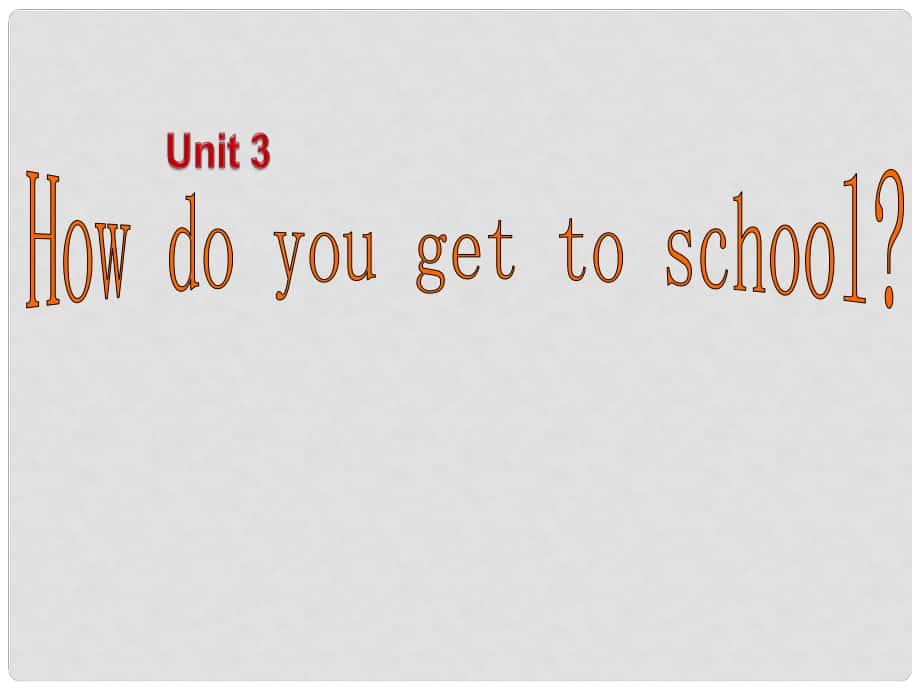《遼寧省東港市黑溝中學(xué)七年級(jí)英語(yǔ)下冊(cè) Unit 3 How do you get to school課件3 (新版)人教新目標(biāo)版》由會(huì)員分享���,可在線閱讀�,更多相關(guān)《遼寧省東港市黑溝中學(xué)七年級(jí)英語(yǔ)下冊(cè) Unit 3 How do you get to school課件3 (新版)人教新目標(biāo)版(34頁(yè)珍藏版)》請(qǐng)?jiān)谘b配圖網(wǎng)上搜索�����。
1����、 How do you get to school?ride a bike (go by bike)take the bus(go by bus)take the train (go by train)take the car (go by car)take the subway(go by subway)walk / go on foottake the plane / go by planebus stopbus stationsubway stationtrain stationA: How do you get to school?B: Well, I ride my bike to
2、the subway station. Then I take the subway.1bTell your partner how you get to school. Imagine you use two types of transportation.bikecar bus trainplanesubway Listen and check () the things that Mary wants to know? Mary wants to know where Bob lives. how far he lives from his grandparents home. how
3��、he gets to his grandparents home. how long it takes to get to his grandparents home. what he thinks of the trip. 1c2LISTEN AGAIN. HOW DOES BOB GET TO HIS GRANDPARENTS HOME? CHECK () 1 OR 2. 1d11eTalk about how Bob gets to his grandparents home.A: HOW DOES GRANDPA GET TO THE PARK?B: FIRST, HE TO C: N
4�、EXT, HE TO D: FINALLY HE To get to the park, first grandpa rides his bike to the subway station. Next he takes the subway to the bus station. Finally he gets to the park. A: HOW DOES NINA GO TO THE LIBRARY?B: FIRST, SHETOC: NEXT, SHETOD: THEN SHE To go to the library, first Nina to . Next she to The
5、n she boatriverbridgevillagevillagerropewaydreambetween100 分分leaveafraidmany = lots ofcross2aLook at the picture and title below. Guess what the passage is about.Crossing the River to SchoolHow do students go to school? 2bRead the passage and answer the questions.How does Liang ling go to school eve
6�、ry day?_He goes on a ropeway to cross the river to school. 1. How do the students in the village go to school? 2. Why do they go to school like this? 3. Does the boy like this school? Why? 4. Whats the villagers dream? Do you think their dream can come true? Why or why not?1. 細(xì)讀每個(gè)問(wèn)題,確定每句話的意思��。細(xì)讀每個(gè)問(wèn)題�����,
7、確定每句話的意思��。2. 帶著問(wèn)題讀短文����,在短文中尋找相關(guān)信帶著問(wèn)題讀短文,在短文中尋找相關(guān)信息��,確定問(wèn)題回答的依據(jù)�。息,確定問(wèn)題回答的依據(jù)�����。3. 找到答題依據(jù)后�����,再根據(jù)問(wèn)題是一般疑找到答題依據(jù)后����,再根據(jù)問(wèn)題是一般疑問(wèn)句還是特殊疑問(wèn)句來(lái)確定如何回答。問(wèn)句還是特殊疑問(wèn)句來(lái)確定如何回答�����。4. 最后,再讀一遍課文���,檢查一下答案的最后,再讀一遍課文���,檢查一下答案的正確性����。正確性����。1. They go on a ropeway to cross the river to school. 2. Because there is a big river their school and the village
8、. Theres no bridge and the river runs too quickly for boats. 3. Yes, he does. He loves to play with his classmates. He loves his teacher.4. Their dream is to have a bridge. Yes. I think so. Many kind people will help them. 1. For the students in the village, it is _ to get to the school.2. They have
9����、 to cross a very _ river between their school and the village.3. They cannot go by boat because the river runs too _. 2cRead the passage again. Complete the sentences with the words from the passage.difficultbigquickly4. It is not easy to cross the river on a ropeway, but the boy is not _. 5. The st
10、udents and villagers want to have a bridge. Can their dream come _?afraidtrue1. think of 認(rèn)為認(rèn)為 What does Bob think of the trip?鮑勃認(rèn)為旅行怎么樣����?鮑勃認(rèn)為旅行怎么樣? 【拓展【拓展】 What do/does sb. think of ? 某人覺得某人覺得怎么樣����?怎么樣�? (= How do/does sb. like?) How does Bob like the trip? 2. Between and 在在與與之間之間 between 是個(gè)介詞�,表示在兩者之是個(gè)介
11、詞����,表示在兩者之 間。間��。如:如:Mary is between Jane and Linda in the line.在隊(duì)伍中�����,瑪麗在簡(jiǎn)和琳達(dá)之間�。在隊(duì)伍中,瑪麗在簡(jiǎn)和琳達(dá)之間����。3. cross 橫過(guò)橫過(guò); 穿越穿越(指橫向穿過(guò)馬路、河指橫向穿過(guò)馬路�、河等等) Look careful before you cross the road. 過(guò)馬路前要細(xì)心看!過(guò)馬路前要細(xì)心看�!4. year 年;年紀(jì)年���;年紀(jì) Mary is only six years old. 瑪麗僅六歲?���,旣悆H六歲。 There are 365 days in a year. 一年中有一年中有365天���。天�。5. afra
12��、id 害怕����;恐懼害怕����;恐懼 ; 形容詞形容詞(1)be afraid 害怕的害怕的 The girl is very afraid. 小女孩很害怕。小女孩很害怕���。 (2)be afraid of 害怕害怕 My sister is afraid of snakes. 我妹妹害怕蛇���。我妹妹害怕蛇。6. like 像像 like 在這里作介詞��,而不是動(dòng)詞。在這里作介詞�,而不是動(dòng)詞。 The fish looks like a big boat.那條魚看起來(lái)像條船那條魚看起來(lái)像條船 ���。(介詞)(介詞) Jane likes history very much.簡(jiǎn)很喜歡歷史����。簡(jiǎn)很喜歡歷史�����。 (動(dòng)詞)(
13����、動(dòng)詞)7. come true 實(shí)現(xiàn);成為現(xiàn)實(shí)實(shí)現(xiàn)���;成為現(xiàn)實(shí) I think our dream can come true.我認(rèn)為我們的夢(mèng)想能實(shí)現(xiàn)�����。我認(rèn)為我們的夢(mèng)想能實(shí)現(xiàn)�。一��、用括號(hào)內(nèi)單詞的適當(dāng)形式填空。一�、用括號(hào)內(nèi)單詞的適當(dāng)形式填空。1. Is it easy for them _ (get) to school?2. The river runs too _ (quick) for boats. 3. His brother _ (cross) the river on a ropeway every day. 4. Can this dream _ (come) true? comet
14��、o getcrossesquickly5. All the _ (village) want to have a nice bridge. 6. It takes six hours to get to his _ (grandparents) home. villagersgrandparents二��、選詞填空�����。二�����、選詞填空����。1. Theres a shop _ our school and the park.think of, come true, by boat, on a ropeway, between between2. The students in Kaishandao goes
15�����、 to school _. 3. How do they cross the big river? They go _. 4. What do you _ the new violin? 5. His parents dream is to have a big house. They think it can _ soon. think ofon a ropewayby boatcome trueA: HOW DO THEY GET TO THE GREAT WALL?B: FIRST, THEY C: NEXT, THEY D: FINALLY THEY To get to the Great Wall, first they to . Next they to Finally they
 遼寧省東港市黑溝中學(xué)七年級(jí)英語(yǔ)下冊(cè) Unit 3 How do you get to school課件3 (新版)人教新目標(biāo)版
遼寧省東港市黑溝中學(xué)七年級(jí)英語(yǔ)下冊(cè) Unit 3 How do you get to school課件3 (新版)人教新目標(biāo)版

